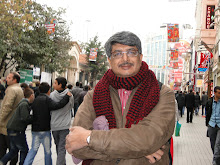A while ago, before embarking on the trip to Kailash-Mansarovar, I had written two posts based on some inspired writings and sayings of Swami Vivekanand. The first one - "I am a Voice without a Form" and the next "Eternal India - A Woman's Place in our Society".
My last post was on Khalil Gibran's piece on Rest and Passion. This talks about the need to balance reason and caution on one hand with passion on the other. Both are seen as necessary in appropriate proportion to be of use to any person. Gibran was a Lebanese-American and was influenced by Syrian (his native) and American (adopted) cultures.
I happened to chance Swami Vivekananda's thoughts, amongst others, on "Secret of Work". Let us see how the Orient sees this. Is it in contrast to what the Occidental believes or do they mean the same thing?
Swamiji was always asked about the presence of passion in work. Let us see his view and then understand it.
"I find it is not true. The less passion there is, the better we work. The calmer we are, better is it for us, and more the amount of work we can do.When we let loose our feelings, we waste so much energy, shatter our nerves, disturb our minds and accomplish very little work."
"The energy which ought to have gone out as work is spent as mere feeling, which counts for nothing. It is only when the mind is calm and collected that the whole of its energy is spent doing good work."
This view puts a lots of emphasis on a cool and collected mind. This state, if and when achieved, is a superior state and best output is achieved then. The conflict that arises is whether the "western" view is the right way or this thought prevails. Are they different, or, both mean the same thing, but say it differently.
On reflection it was clear. Passion in Swamiji's context meant feverishness, restlessness, anger, hatred or something done with an intention to take revenge, and, these had to be rightly rejected. They had no place at all in our thought process. A cool and collected mind inclued a pleasant outlook, interest, enthusiasm and a positive approach. A sort of energy without the negative attachments. A calm and a collected mind has all these qualities and any work done with this turns out to be superlative.
There is no difference in the two thought streams.
I can vouch for this having observed that the day we are relaxed and calm we have a great day at office and the day we are irritable (whatever be the cause) or overly excited, we come a complete cropper. I never imagined that our ancient wise men had thought of such practical philosophy applicable in this day and age.
Swamiji was always asked about the presence of passion in work. Let us see his view and then understand it.
"I find it is not true. The less passion there is, the better we work. The calmer we are, better is it for us, and more the amount of work we can do.When we let loose our feelings, we waste so much energy, shatter our nerves, disturb our minds and accomplish very little work."
"The energy which ought to have gone out as work is spent as mere feeling, which counts for nothing. It is only when the mind is calm and collected that the whole of its energy is spent doing good work."
This view puts a lots of emphasis on a cool and collected mind. This state, if and when achieved, is a superior state and best output is achieved then. The conflict that arises is whether the "western" view is the right way or this thought prevails. Are they different, or, both mean the same thing, but say it differently.
On reflection it was clear. Passion in Swamiji's context meant feverishness, restlessness, anger, hatred or something done with an intention to take revenge, and, these had to be rightly rejected. They had no place at all in our thought process. A cool and collected mind inclued a pleasant outlook, interest, enthusiasm and a positive approach. A sort of energy without the negative attachments. A calm and a collected mind has all these qualities and any work done with this turns out to be superlative.
There is no difference in the two thought streams.
I can vouch for this having observed that the day we are relaxed and calm we have a great day at office and the day we are irritable (whatever be the cause) or overly excited, we come a complete cropper. I never imagined that our ancient wise men had thought of such practical philosophy applicable in this day and age.




